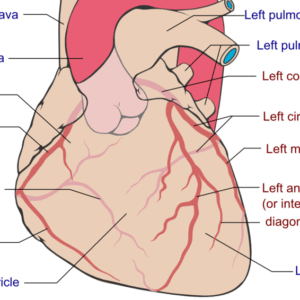Cardiology > Constrictive Pericarditis
Constrictive Pericarditis
Background
Constrictive pericarditis is a chronic inflammatory disorder characterized by thickening, fibrosis, and often calcification of the pericardium, which restricts diastolic filling of the heart. This leads to symptoms of right-sided heart failure with preserved systolic function. The rigid pericardium prevents normal cardiac expansion during diastole, causing elevated and equalized diastolic pressures in all chambers.
II) Classification/Types
By Pathology:
- Idiopathic or Viral (most common in developed countries)
- Post-surgical or Post-radiation
- Tuberculous (most common in developing countries)
- Uremic, neoplastic, or autoimmune-related
By Morphology:
- Chronic fibrosing pericarditis
- Calcific constrictive pericarditis
By Coexisting Pathology:
- Effusive-constrictive pericarditis: Constriction occurs with concurrent pericardial effusion.
III) Pathophysiology
Pericardial injury from various causes initiates inflammation, leading to fibrin deposition, collagen fibrosis, and occasionally calcification. The resultant noncompliant pericardium restricts ventricular filling during mid-to-late diastole, leading to elevated venous pressures, decreased stroke volume, and dissociation of intrathoracic pressure transmission (ventricular interdependence).
IV) Epidemiology
- Age: Typically seen in middle-aged and older adults
- Geography:
- Developed countries: Idiopathic, viral, post-cardiac surgery, radiation
- Developing countries: Tuberculosis is the leading cause
- Sex: Slight male predominance
Etiology
I) Causes
- Idiopathic/viral (presumed viral pericarditis)
- Post-cardiac surgery (e.g., CABG, valve replacement)
- Radiation therapy (especially >35 Gy to mediastinum)
- Tuberculosis
- Autoimmune disease (SLE, RA, sarcoidosis)
- Uremia
- Neoplasia (e.g., breast, lung, lymphoma)
- Post-infectious (bacterial, fungal)
II) Risk Factors
- Prior cardiac surgery or radiation
- Tuberculosis exposure or history
- Autoimmune disease
- Malignancy
- Chronic kidney disease
Clinical Presentation
I) History (Symptoms)
- Progressive fatigue and exercise intolerance
- Abdominal distension (ascites), early satiety
- Lower extremity edema
- Dyspnea, orthopnea
- Weight loss, cachexia in advanced disease
- History of pericarditis, TB, or chest radiation
II) Physical Exam (Signs)
Vital Signs:
- May be normal or show low pulse pressure
Neck:
- Elevated jugular venous pressure (JVP) with prominent y descent
- Kussmaul’s sign: JVP rises with inspiration
Cardiac:
- Pericardial knock: Early diastolic sound
- Muffled heart sounds
Abdomen:
- Ascites, hepatomegaly, pulsatile liver
Peripheral:
- Pitting edema, cool extremities
Differential Diagnosis (DDx)
- Restrictive cardiomyopathy
- Right-sided heart failure (e.g., pulmonary hypertension)
- Budd-Chiari syndrome
- Cirrhosis
- Cardiac tamponade
- Severe tricuspid regurgitation
Diagnostic Tests
Initial Tests
ECG:
- Low voltage QRS
- Nonspecific ST-T changes
- Atrial fibrillation (in advanced disease)
Chest X-ray:
- Pericardial calcifications
- Small or normal heart size
- Pleural effusions
Echocardiogram (TTE):
- Septal bounce (interventricular dependence)
- Biatrial enlargement
- Preserved EF
- Dilated IVC with reduced respiratory variation
- Pericardial thickening (may be limited by acoustic windows)
Cardiac CT or MRI:
- Best modality to assess pericardial thickening (>4 mm), calcification
- Pericardial enhancement (active inflammation)
Cardiac Catheterization (Definitive):
- Equalization of diastolic pressures in all chambers
- “Square root sign” or dip-and-plateau pattern in ventricular pressure tracing
- Discordance of LV and RV systolic pressures with respiration
Laboratory Tests:
- ESR/CRP: May be elevated if active inflammation
- ANA, RF if autoimmune suspected
- TB testing (PPD, interferon gamma release assay)
Treatment
I) Medical Management
Trial of Anti-inflammatory Therapy (if active inflammation suspected):
- NSAIDs + Colchicine
- Corticosteroids in autoimmune or refractory cases
- May reverse early constrictive physiology
Diuretics:
- Symptomatic relief of volume overload
- Use cautiously to avoid preload reduction and low cardiac output
II) Interventional/Surgical
Pericardiectomy (Definitive treatment):
- Surgical removal of pericardium
- Indicated in chronic constriction with persistent symptoms
- Requires median sternotomy or thoracotomy
- Operative mortality ~6–12%, higher in radiation or TB-related cases
Patient Education, Screening, Vaccines
Education:
- Explain chronic nature and treatment options
- Need for lifelong follow-up after surgery
- Importance of early reporting of recurrent symptoms
Lifestyle:
- Sodium restriction if fluid retention
- Monitor daily weights
Vaccinations:
- Influenza
- Pneumococcal
- COVID-19 (especially in those immunocompromised or post-op)
Consults/Referrals
- Cardiology: For diagnostic evaluation and management
- Cardiothoracic Surgery: For pericardiectomy evaluation
- Infectious Disease: If TB or fungal etiology suspected
- Rheumatology: For autoimmune workup
- Nephrology: If uremic etiology suspected
Follow-Up
- Serial imaging (echo or MRI) if under conservative management
- Monitor volume status and adjust diuretics as needed
- Post-pericardiectomy: Long-term cardiac monitoring, re-evaluation of symptoms
- Prognosis: Improved symptoms after pericardiectomy in 80–90%, though functional recovery may take months
Related Articles

Stay on top of medicine. Get connected. Crush the boards.
HMD is a beacon of medical education, committed to forging a global network of physicians, medical students, and allied healthcare professionals.
